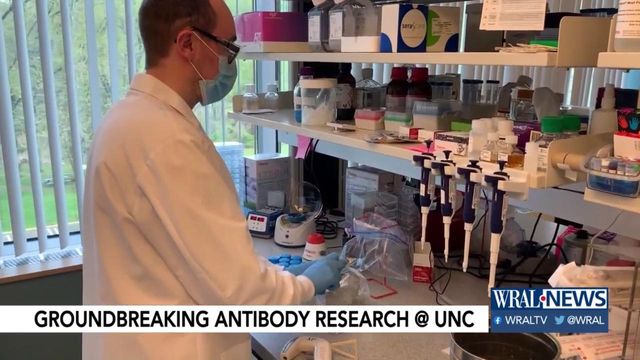Study: Antibody treatment can help prevent people from contracting COVID
An antibody infusion therapy designed to help coronavirus patients recover faster may actually prevent people from getting the virus.
Posted — UpdatedA new clinical trial conducted by the University of North Carolina in more than 100 nursing homes across the country shows promising results, with the data suggesting that the antibodies can reduce the risk of infection by 80 percent.
Researchers involved in the trial said to think of combating the pandemic as a three-legged stool. First, by changing behavior such as wearing masks, the second being vaccines and the third being monoclonal antibodies, which were used in this study.
"There's no magic bullet. Everything contributes to our understanding of the pandemic," said Dr. Myron Cohen, the associate vice chancellor for Global Health and Medical Affairs at UNC Medical School.
To better understand the virus, UNC researchers, the National Institutes of Health and pharmaceutical company Eli Lilly teamed up to conduct a clinical trial focused on our most vulnerable population.
"In our most recent study, we have pretty strong evidence that in residents of nursing homes when we provided them these monoclonal antibodies, we were able to prevent the acquisition of COVID," explained Cohen.
The therapy uses manmade antibodies like the antibodies COVID-19 patients naturally produce.
"When adjusting for the number of cases that were occurring at that nursing home, [we] found an 80 percent reduction in development of COVID-19 disease among those who got the antibody compared to those who got placebo," said Dr. David Wohl, an infectious disease expert at UNC.
Experts said very few of those who received the antibodies went on to contract the virus.
"This is a bad disease," said Cohen. "There were deaths in the placebo group and no deaths in the group that got the antibody."
While this study is promising, there are still unanswered questions about the virus and ways to combat it.
"The next thing for us to do, to forewarn you, is we need to see if we can give antibodies and vaccines at the same time," explained Cohen.
Those involved in the study said it’s a great step to help protect those where COVID tends to run rampant.
"We can look at this as a bridge. This can be a big deal when there's a nursing home that's dealing with a COVID-19 outbreak where you don't have enough time to vaccinate everyone because it takes too long to build up immunity," explained Wohl. "A quick fix could be getting antibody infusions into as many people as possible and that way preventing the spread."
Researchers added that they also want to answer how these antibodies match up against variants of coronavirus. They added that it's promising that these antibodies are easy to swap out, meaning health experts can quickly tweak the treatment to cover whichever variant pops up.
Related Topics
• Credits
Copyright 2024 by Capitol Broadcasting Company. All rights reserved. This material may not be published, broadcast, rewritten or redistributed.





